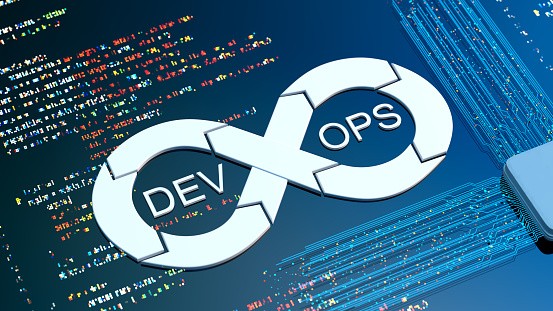The era of digital transformation introduces new challenges every day. So, it becomes crucial to enhance your team productivity with DevOps. And combining DevOps and automation can speed up productivity and efficiency. So, businesses can easily adopt DevOps practices for their operations & processes. If you want to know how it will affect the future of digital transformation, then let’s dive in.
An Overview of DevOps
In traditional software development settings, teams often work in silos. On one side, the developers focus on writing code, while operations handle deployment. This separation can lead to communication gaps and delays in launching products. DevOps then came up with the collaboration between development and operations. So, to get the two teams on one page to streamline the entire SDLC.
DevOps and automation have become a game-changer for businesses to improve their agility and satisfaction. Its iterative approach enables teams to develop, test, and release software faster. And focuses on collaboration, automation, and real-time monitoring.
Key benefits of using DevOps for businesses
Here are some advantages of using DevOps consulting services for your business.
Enhanced security
Security is a critical concern in software development with the rise in cyberattacks. So, DevOps emphasizes secure coding practices and automated testing. By adopting shift-left security, potential vulnerabilities to detect security breaches. DevOps and automation enable rapid patching in case of vulnerability, helping businesses protect their users.
Reduced costs
The cost of software development can be significant, especially in large-scale projects. DevOps consultants help minimize these costs by increasing efficiency across the SDLC. With task testing, deployment, and environment setup. DevOps reduces the need for manual intervention, lowering the risk of human errors.
Reliable delivery
In traditional development, teams may spend weeks setting up environments. DevOps simplifies these tasks through automation, allowing teams to focus on innovation. Automated testing ensures that code changes get verified quickly for continuous feedback. The CI/CD framework in DevOps and automation plays a pivotal role in speeding up the releases. By automating integration and deployment tasks businesses can deploy new features.
Continuous service
Once a product is released, user expectations for timely support and updates become critical. In many traditional setups, development teams move on to new projects. And it leaves operations teams to handle any issues post-release. DevOps, through CI/CD pipelines, addresses this challenge by ensuring continuous integration. The result is software that evolves alongside user needs to reduce performance issues. Automated monitoring and feedback loops allow DevOps consultants to address issues.
Improved satisfaction
User expectations are constantly evolving and achieving these expectations is vital. DevOps brings development and operations teams together for real-time communication. Operations teams have direct insight into customer issues to inform development efforts. This collaboration creates products attuned to customer expectations.
Related Blog: Finding the Right DevOps Engineer: A Comprehensive Guide
The impact of DevOps and automation on digital transformation
Here are some of the ways DevOps has reshaped digital transformation:
Increased collaboration
DevOps breaks down traditional silos, fostering collaboration between cross-functional teams. DevOps creates a shared sense of responsibility and promotes transparency.
- Aligns development and operations with business goals.
- Reduces issue resolution time, as potential roadblocks are identified earlier.
- Encourages a culture of accountability for the success of the project.
Accelerated delivery
In a highly competitive market, speed-to-market is critical. DevOps and automation practices automate manual processes. Such as integration, testing, and reducing the time from creation to deployment. Continuous delivery pipelines automate the software lifecycle and releases. This increased speed improves time-to-market and enhances adaptability. It allows organizations to pivot quickly based on changing market demands.
Improved quality
Quality assurance is fundamental to DevOps. By emphasizing continuous feedback, DevOps ensures that software is reliable. Automated testing catches issues before they reach production and identifies problems. Also, it allows teams to take proactive measures. This focus on quality translates into better user satisfaction and a positive reputation.
Data-driven decisions
DevOps consultants encourage the collection and analysis of data across the software lifecycle. This data provides insights into user behavior and system performance for improvement. By leveraging these insights, businesses can make informed decisions. It prioritizes features that align with user needs and optimizes resource allocation.
Enhanced productivity
DevOps and automation fosters a culture of continuous improvement which benefits productivity. By automating repetitive tasks, DevOps frees up time for teams to focus on strategic initiatives. The communication fostered by DevOps engineers contributes to a supportive work environment. And the employees feel valued and empowered to contribute to meaningful work.
Embracing DevOps for a competitive edge
Let’s look at how businesses can begin their DevOps journey:
- Start Small: Begin with a pilot project to introduce DevOps principles gradually. It allows teams to become familiar with DevOps practices without disrupting existing workflows.
- Invest in Automation: Implement automation tools for testing, integration, and deployment to free up resources.
- Encourage a DevOps Culture: Promote a culture of collaboration, transparency, and continuous learning. Encourage cross-functional teamwork to foster accountability.
- Monitor and Improve: Use monitoring tools to collect data on system performance. Continuous feedback loops ensure that teams can make data-driven improvements over time.
Conclusion:
DevOps has transformed software development and bridges the gap between development and operations teams. And supports rapid innovation, product delivery, and better customer service. Or you Hire DevOps Engineer for more assistants.




